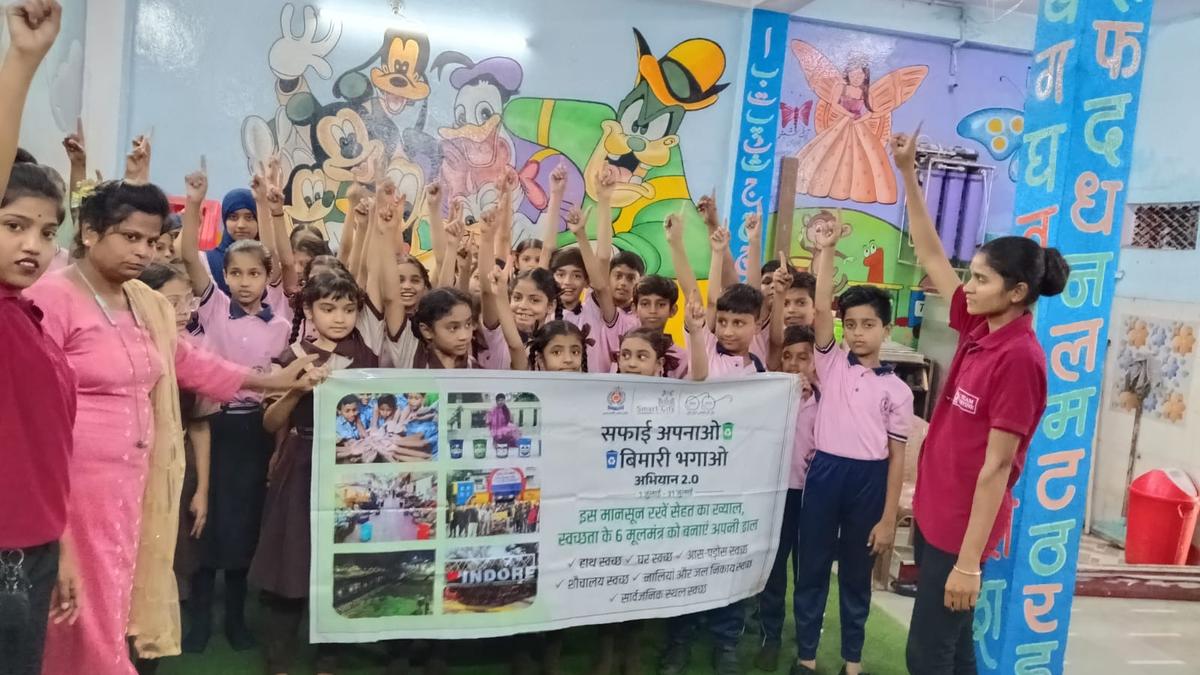
On Gandhi Jayanti, as the nation revisits Mahatma Gandhi’s vision of a clean India, Indore stands tall with its reputation as the country’s cleanest city for seven consecutive years. But how deeply has this vision seeped into the city’s schools, where future citizens are being shaped? A closer look shows that while Swachh Bharat Abhiyan has created visible awareness, institutional integration into curriculum and school life remains uneven.
Swachh Bharat Abhiyan, launched in 2014, was set out to transform sanitation and waste management practices across the country. Indore, often called the ‘cleanliness capital of India,’ has been at the forefront of this mission. Through a combination of strict municipal enforcement, public participation, and community-driven campaigns, the city has remarkably improved in waste management and has built a systematic, rather than psychological, culture where cleanliness is seen as a shared civic duty.
Indore’s model has been a mix of innovation and discipline through awareness drives in markets, residential colonies, and schools. At Shishukunj International School, Indore, a top-ranked co-ed day school in Madhya Pradesh, cleanliness is spoken of more as part of general social responsibility than as structured learning. Anshu Jain, parent of a Class 7 student, says, “Often there are awareness discussions in school, where students are taught to keep roads and monuments clean and not litter in public spaces. There, however, are no specific curriculum modules on Swachh Bharat in textbooks, nor activities are conducted particularly on this topic. It’s mostly general talk about being responsible citizens.”
Some other schools, however, have taken modest steps towards weaving cleanliness into classroom life. At Delhi Public School (DPS), Indore, which ranks among the top co-ed schools in the State, social studies teacher and department coordinator, Rahela Ahmed, explained, “In Class 6, we teach a chapter on the ‘Value of Work,’ where Swachh Bharat Abhiyan is one of the sections. Activities are based on chapters related to Swachh Bharat Abhiyan, and students are involved.”
Ms. Rahela recalled one such event where Class 3 students held a rally, “once we had a rally where students made posters, dressed as plastic bottles, garbage bins, and picked up garbage within the school campus, this was done for awareness about Swachh Bharat Abhiyan. Swachh Bharat is a national mission, and we cannot ignore it. Even if not in textbooks, children must learn to value cleanliness in practice.”
From the administrative side, the Indore Municipal Corporation (IMC) says it does reach out to schools regularly, particularly around Swachh Survekshan surveys. Sandeep Patodi, Chief Health Officer, explained that teams visit schools and coaching institutes to conduct awareness sessions about the mission. “We explain to students how Indore has consistently ranked number one because of collective efforts, and encourage them to carry forward the same habits of keeping roads and homes clean and segregating waste,” he said.
These sessions often focus on practical aspects such as the correct use of dustbins, discouraging littering, and proper disposal of wrappers and everyday waste. Beyond classrooms, IMC also organises exposure visits, hosting school groups at the city’s trenching ground to show how waste is segregated and processed on a large scale.
Awareness efforts extend into the urban landscape as well. The paintings on Indore’s footpaths and select walls are part of IMC’s outreach programme, designed to remind citizens of cleanliness goals in public spaces. Similar drives are also carried out in corporate offices, hospitals, and other institutions, ensuring that the message of swachhata is reinforced across multiple settings.
According to UDISE+ 2024-25 data, Madhya Pradesh has made significant progress in sanitation, over 99% of schools report having both girl’s and boy’s toilets, with more than 98% of them functional. However, gaps remain in handwashing facilities and daily hygiene practices, especially in rural or semi-urban schools, where one-off activities during Gandhi Jayanti or Swachhta Pakhwada often substitute for continuous engagement.
On Gandhi Jayanti, as the city takes pride in its cleanliness laurels, many educators underline that the movement must begin in classrooms. As Indore celebrates the national recognition for cleanliness, classrooms across the city illustrate progress as well as challenges ahead, demonstrating that the journey to a clean India may well begin with the habits cultivated in its youngest citizens.



